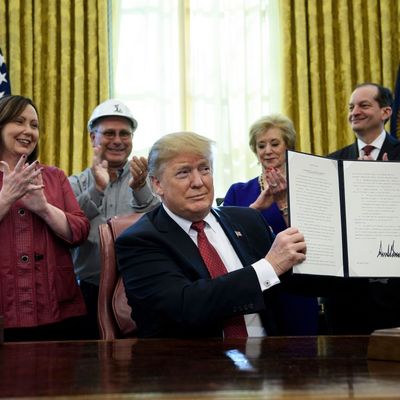
Federal judges keep ruling against the Trump administration, frustrating the president’s attempts to dismantle Obama-era policies and environmental protections. In a new analysis from the Washington Post, reporters Fred Barbash and Deanna Paul determine that federal judges have blocked the Trump administration at least 63 times in the last two years.
The reporters present a pretty simple reason for the administration’s repeat defeats: “In case after case, judges have rebuked Trump officials for failing to follow the most basic rules of governance for shifting policy, including providing legitimate explanations supported by facts and, where required, public input.”
The most prominent example of the administration jumping the gun was with the travel ban, announced just seven days after Trump’s inauguration. Though a version of the ban was eventually upheld by the Supreme Court a year and a half after the initial attempt, a lower court initially blocked the move to restrict travel from predominantly Muslim countries as discriminatory. Another high-profile example is the rejection to rescind the Deferred Action for Childhood Arrivals program, which protects some 700,000 young adults. U.S. district judge John D. Bates stated that the administration’s claim that DACA was unlawful was “virtually unexplained.”
According to the Post, two-thirds of the cases blocked by federal courts involve the Trump administration violating the Administrative Procedure Act, a statute from 1946 designed to make sure government branches are staying in their respective lanes. Normally, a given administration will win around 70 percent of APA cases, but as of January 2019, Trump’s win rate stood around 6 percent.
“What they have consistently been doing is short-circuiting the process,” Georgetown Law professor William W. Buzbee told the Post. In regulatory cases, Trump doesn’t “even come close” to properly explaining legislative action. “[They’re] making it very easy for the courts to reject them because they’re not doing their homework,” he said.
In some cases, Trump isn’t doing himself any favors. His alleged description of Haiti and El Salvador as “shithole countries” reportedly helped convince U.S. district judge Edward M. Chen to block the administration’s decision to end “temporary protected status” for hundreds of thousands of immigrants from Central America, Haiti, and Sudan. Chen determined that the order was clouded with racial and ethnic bias.
According to the Post, “at least a dozen decisions have involved Trump’s tweets or comments.” In particular, the blockages are slowing down the Trump administration’s rollback of environmental regulations.
When it comes to regulatory reform, at least, the president can retire his “tired of winning” slogan. Matthew Collette, a former deputy director at the Justice Department, told the Post that in his 30-year career there, he had not seen such a frequency of losses in such a short time. “I don’t think there’s any doubt about that,” he said.






























